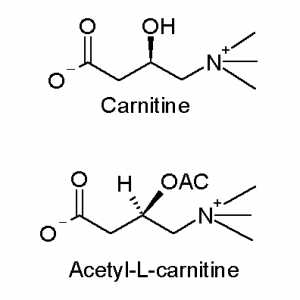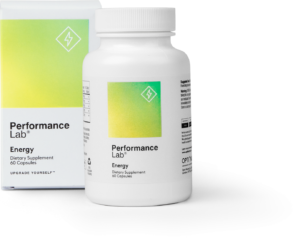
Tribulus terrestris does not boost testosterone, yet it’s in damn near every testosterone booster. Acetyl-L-Carnitine (ALCAR) is the Tribulus of the nootropic market.
Sort of.
ALCAR does enhance, or at least protect, cognition, but only for specific demographics. For the boring ol’ average Joe (i.e. YOU, probably), ALCAR works subtly and microscopically. Maybe you’ll notice a significant energy boost, maybe you’ll notice jack squat. And until we figure out to how much squat actually amounts, we’ll just have to slap a big ol’ question mark on this compound.
Unless we can solve that question mark in this review.
Page Contents
How ALCAR Is Supposed to Work
L-Carnitine is a semi-essential amino acid synthesized in the brain and body, used for a variety of metabolic functions. Essentially, all you need to know about carnitine:
You need it to function.
This doesn’t make carnitine a unique amino acid — you “need” all amino acids to function — yet, it deserves special attention for its neuroprotective role on cognition. As you age, metabolic energy and brain chemistry goes all wonky, and one of the reasons for this is:
↑ in aging has been associated with ↓ natural carnitine synthesis.

The other option, the nootropic option and the subject of this review, is supplement Acetyl L Carnitine (ALCAR), the carnitine form capable of crossing the blood-brain barrier (not all carnitine can do this). The bio-benefits associated with ALCAR include:
Maintains Mitochondrial Productivity
The theory behind ALCAR’s mitochondrial action: ALCAR acts as fatty acid transporter, shuttling fatty acid material through mitochondrial membranes — or out of mitochondrial membranes. This does two things:
- Provides fuel for mitochondria to transfer into energy.
- Flushes the toxic byproducts of mitochondrial metabolism.
Ultimately, this support leads to better functioning mitochondria, i.e. enhanced energy production, an important aspect of maintaining the brain, the most energy-demanding organ of the body. Ugh. More on Nootropic Brain Energy.
Supports Acetylcholine Status
ALCAR’s chemical structure resembles the neurotransmitter acetylcholine (ACh), a key neurotransmitter to memory, learning, and long-term cognitive health. The structural similar enables ALCAR to serve as raw precursor material to ACh, a bio-benefit similar to citicoline and alpha-GPC, which are commonly stacked with ALCAR.
The combination of decreased ALCAR levels and decreased carnitine acetyltransferase, an enzyme that converts carnitine to ACh, in older folk contributes to age-related cognitive deterioration. Mixing ALCAR with a choline source (citicoline or alpha-GPC) in addition to a cholinergic racetam (e.g. piracetam) may help ALCAR support elderly ACh status.
ALCAR Benefits

The word “elderly” keeps popping up, so I might as well come out with it:
ALCAR’s most promising research largely pertains to elderly cognition.
Despite ALCAR’s soaring popularity (that was fun to write) in manufactured nootropic supplements, the nootropic’s benefits for the average-shmaverage individual — i.e. the healthy 20 to 40 year old, male or female — are largely speculative. It’s possible that ALCAR’s benefits still affect younger users, just on a too subtle of a level to be felt. My intuition states: ALCAR works as a bona fide energy enhancing nootropic, but its cognitive enhancement effects generally aren’t noticeable until natural carnitine levels diminish via the natural process of aging (or the unnatural over-consumption of alcohol).
Other forms of carnitine often associate with fat burning (e.g. L-Carnitine L-Tartrate), due to their fatty acid transporter action. For this, I don’t see anything wrong with supplementing carnitine — if anything, the soaring popularity of carnitine is justified by its well-documented neuroprotective, or longevity enhancing, effects.
Researchers Have Suggested ALCAR Might:
Improve mild cognitive impairment (MCI)
This meta-analysis of double blind randomized controlled clinical trials assessed the use of ALCAR for cognitive decline, compiling the results of 21 studies, a total of 1204 patients (591 who took ALCAR, 613 on placebo). After reviewing the studies, the researchers found ALCAR to have a significant improvement on attention, mental performance, memory, and higher intellectual functions, leading to the conclusion that “[c]ompared with placebo, Alcar improved mild cognitive impairment or prevented deterioration, and was well tolerated.”
Slow the rate of cognitive deterioration
In this long-term (1-year) study on a decent sample size (130 patients), the oral administration of ALCAR was studied for its effects on function and cognitive impairment. By the end of the year trial, both groups (ALCAR and placebo) worsened, yet the ALCAR group demonstrated a slower rate of deterioration in 13 of the 14 measured outcomes, including the Blessed Dementia Scale, logical intelligence, verbal critical abilities, long-term verbal memory, and selective attention. The conclusion: “The analysis for patients with good treatment [ALCAR] compliance showed a greater drug benefit than for the overall sample. Reported adverse events were relatively mild, and there was no significant difference between the treated and placebo groups either in incidence or severity.”
Counteract symptoms of elderly depression
Placebo-controlled study: 28 elderly patients (aged 70 – 80) affected by DSM III-defined depressive disturbance were subdivided into two groups by administration: 1) 500 mg ALCAR 3 times daily, 2) placebo. Outcomes were measured by the Hamilton Rating Scale for Depression, the Beck Depression Inventory, the Sandoz Clinical Assessment–Geriatric, and clinical global impression. By the study’s end, the ALCAR group demonstrated symptom relief on the Hamilton Rating Scale and Beck Depression Inventory, with beneficial behavioral effects. The conclusion: “This investigation establishes that [ALCAR] is effective in counteracting symptoms of depression in the elderly.”
Alleviate alcoholic-induced cognitive problems
Elderly and alcoholics. This study focuses on the latter, evaluating ALCAR’s effects on alcoholic-induced cognitive impairments among 55 alcoholics. Prior to the trial, the patients refrained from alcoholic consumption for a month, after which 2 g ALCAR or placebo was administered daily for 90 days. After the 90-day trial, the ALCAR group demonstrated significant improvement on long-term memory, logical memory, the Similarities WAIS subtest, and the copying drawing test. The researchers concluded that “acetyl-L-carnitine can be a useful and safe therapeutic agent in the subtle cognitive disturbances of chronic alcoholics.”
How to Take ALCAR
- Retail ALCAR dosages range between 250 – 500 mg daily.
- Clinical recommendations aim higher: 500 – 2,000 mg daily.
- Dosages vary by carnitine form (ALCAR, LCLT, GPLC), yet the only carnitine that nootropic enthusiasts need to concern themselves with is ALCAR.
My Experience with ALCAR
I’ve supplemented plenty of ALCAR via various manufactured nootropic stacks, yet I don’t claim to have an “ALCAR Experience.” Namely because I don’t feel ALCAR.
I’m simply not old enough to require ALCAR’s mitochondrial support.

Granted, I do frequent the booze on the weekends, and often think ALCAR might help my hurt hungover brain — although, I suspect that ALCAR’s “alcoholic” benefits primarily apply to, well… true alcoholics. Admittedly, there aren’t many ALCAR customer reviews on this point. But it’s not a bad idea to toss ALCAR in your nootropic stack, particularly if you’re a 20- to 30-something active bargoer. (Hell, even if you’re a 40+ active bargoer.)
Bargoing aside, ALCAR’s mitochondrial enhancement benefits do seem promising, and I find it reasonable for so many nootropic brain health stacks to include this energy boosting amino. Similar to phosphatidylserine, which I classify as an elderly nootropic (albeit awesome elderly nootropic), ALCAR’s bio-benefits don’t seem to become subjectively apparent until the later years.
Even so: with everything we know thus far about ALCAR, it seems greater than a “why not?” ingredient, landing somewhere within the “it’s an absolutely good idea” terrain. Or at least that’s my recommendation based on my experience: supplementing ALCAR is absolutely a good idea for long-term mental and physical performance.
Is ALCAR a Good Nootropic?
For ye olden folk: Yes.
For ye recovering alcoholics: Sure.
For everyone else? ALCAR is a maybe, potentially operating primarily as a energy-producing fatty acid burner. Ironically, there’s a decent amount of research on this compound, enough for us to have some sort of bearing on how it affects our health, mentally and physically. As such, we can confidently claim that: Yes, ALCAR works for boosting energy, subtly working on a microscopic, metabolic level. Not enough to have you bouncing off the walls, but great enough to raise the bar on your cognition and energy levels over time.
Read my Best Nootropic Supplements to Buy in 2020 list here.
Best Nootropic Supplement with Acetyl-L-Carnitine
I have no statistical proof of this, but if I had to guess: I think more people supplement standalone carnitine supplements with physique goals in mind rather than nootropic goals. However, when teamed up with other cognitive and/or mitochondrial enhancing ingredients, ALCAR may achieve significant brain boosts not otherwise achieved alone. Which is why I’ve taken it upon myself to find the best nootropic supplement with acetyl-L-carnitine; a pre-made brain health stack that maximizes ALCAR’s synergy potential with other smartly chosen nootropics.
Here’s what I’ve found:
Performance Lab Energy
 ALCAR has a fairly large dosage requirement, which Performance Lab Energy fulfills with its 750 mg supply of Acetyl-L-Carnitine. As an energy boosting supplement, Performance Lab Energy focuses more so on metabolic, mitochondrial energy production more so than cheap, caffeine stimulation.
ALCAR has a fairly large dosage requirement, which Performance Lab Energy fulfills with its 750 mg supply of Acetyl-L-Carnitine. As an energy boosting supplement, Performance Lab Energy focuses more so on metabolic, mitochondrial energy production more so than cheap, caffeine stimulation.
In other words, Performance Lab Energy is a natural energy booster that genuinely boosts your brain and body’s natural energy production levels.
Accompanying Performance Lab Energy’s ALCAR are other mitochondrial acting energy boosters, such as R-Lipoic Acid, CoQ10, and PQQ — each in premium, patented brand formats. All ingredients support and protect mitochondrial function from various bio-pathways, creating a truly unique synergy of brain boosting results.
Want some? Get the Best Deal on Performance Lab Energy here.
Read my in-depth review on Performance Lab Energy.
Overall ALCAR Nootropic Power Rating
[yasr_multiset setid=0]
